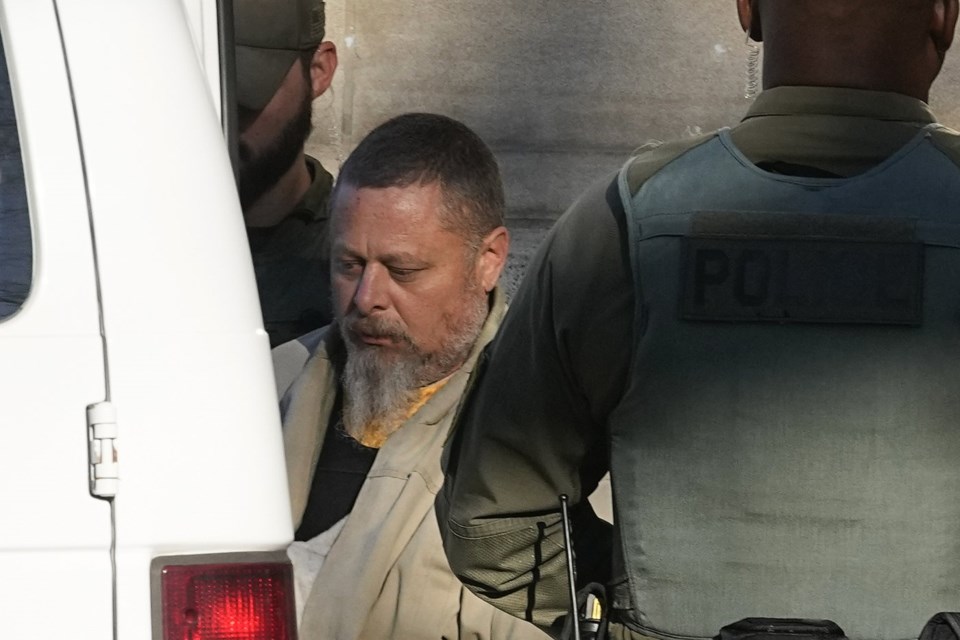Indianapolis (AP) ŌĆö An Indiana man convicted in the who vanished during a winter hike was sentenced to a maximum of 130 years in prison Friday in the case thatŌĆÖs long cast a shadow over the teensŌĆÖ small hometown of Delphi.
A special judge sentenced Richard Allen during a hearing that began at 9 a.m. Allen, 52, was in the killings of Abigail Williams, 13, and Liberty German, 14, known as Abby and Libby. A jury found him guilty of two counts of murder and two counts of murder while committing or attempting to commit kidnapping.
Allen was sentenced on two of the four murder counts by Allen County Superior Court Judge Fran Gull, who imposed the maximum of 65 years for each count, to be served consecutively. The sentencing hearing, which included victim impact statements from six relatives of the teens, lasted less than two hours and after it concluded one of AllenŌĆÖs defense attorneys said they plan to appeal and seek a new trial.
ŌĆ£Thoughts and prayers to the families of the victims. What they went through was unimaginable,ŌĆØ defense attorney Jennifer Auger said. She added that the defense plans to give a more detailed statement later, ŌĆ£but today is not the day for that.ŌĆØ
Allen had faced between 45 years and 130 years in prison in the killings of the Delphi teens.
Allen also lived in Delphi and when he was more than five years after the killings, he was employed as a pharmacy technician at a pharmacy only blocks from the county courthouse where he later stood trial. His weekslong trial came after repeated delays, a leak of evidence, the and their .
The case, which included tantalizing evidence, has long drawn outsized attention from true-crime enthusiasts. The teens were found dead in February 2017, their throats cut, one day after they vanished while hiking during a day off school.
Gull, the special judge who oversaw Allen's trial, came from northeastern IndianaŌĆÖs Allen County, as did the jury.
The seven women and five men were sequestered throughout in the Carroll County seat of Delphi, the girlsŌĆÖ hometown of about 3,000 residents some 60 miles (100 kilometers) northwest of Indianapolis.
Allen's trial came after repeated delays, a leak of evidence, the and their .
The case, which included tantalizing evidence, has long drawn outsized attention from true-crime enthusiasts.
A relative dropped the teens off at a hiking trail just outside Delphi on Feb. 13, 2017. The eighth graders didn't arrive at the agreed pickup location and were reported missing that evening. Their bodies were found the next day with their throats cut in a wooded area near an abandoned railroad trestle they had crossed.
In his closing arguments, Carroll County Prosecutor Nicholas McLeland told jurors that Allen, armed with a gun, forced the youths off the hiking trail and had planned to rape them before a passing van made him change his plans and he cut their throats. McLeland said an unspent bullet found between the teensŌĆÖ bodies AllenŌĆÖs .40-caliber Sig Sauer handgun.
An Indiana State Police firearms expert told the jury her analysis tied the round to AllenŌĆÖs handgun.
McLeland said Allen was the man seen following the teens across the Monon High Bridge in a grainy cellphone video German had recorded. And he said it was AllenŌĆÖs voice that could be heard on that video telling the teens, ŌĆ£ ŌĆ│ after they crossed the bridge.
ŌĆ£Richard Allen is Bridge Guy,ŌĆØ McLeland told jurors. ŌĆ£He kidnapped them and later murdered them.ŌĆØ
McLeland also noted that Allen had repeatedly confessed to the killings ŌĆö in person, on the phone and in writing. In one of the recordings he replayed for the jury, Allen could be heard telling his wife, ŌĆ£I did it. I killed Abby and Libby.ŌĆØ
AllenŌĆÖs defense argued that his confessions were unreliable because he was facing a severe mental health crisis while under the pressure and stress of being locked up in isolation, watched 24 hours a day and taunted by people incarcerated with him. A psychiatrist called by the defense testified that months in solitary confinement could make a person delirious and psychotic.
Defense attorney Bradley Rozzi said in his closing arguments that Allen was innocent. He said no witness explicitly identified Allen as the man seen on the hiking trail or the bridge the afternoon the girls went missing. He also said no fingerprint, DNA or forensic evidence links Allen to the murder scene.
AllenŌĆÖs lawyers had sought to argue during the trial that the girls were killed by members of a white nationalist group known as the Odinists who follow a pagan Norse religion. The judge, however, ruled against that, saying the defense ŌĆ£failed to produce admissible evidenceŌĆØ of such a connection.
Rick Callahan, The Associated Press



